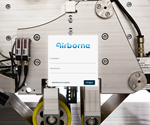Airborne, NCC to develop AFP data warehouse architecture
Using the National Composites Centre’s Automated Fiber Placement (AFP) machine, the project will develop a data warehouse to connect automation with digitalization and enable Industry 4.0.

The National Composites Centre (NCC, Bristol, U.K.) and Airborne (The Hague, Netherlands) are working together to design a system to collect and store data from an Automated Fiber Placement (AFP) machine.
For the collaborative project, the companies are defining use cases by considering source and type of data from sensors. The challenge, Airborne says, is to develop a data warehouse capable of providing insights through analytics to allow future optimization. These first steps will reportedly be the basis for the project’s vision to connect automation with digitalization and enable Industry 4.0 capability. The project has already started and is planned to be complete by November 2019.
The AFP machine at the NCC was acquired as part of the iCap program, which is a £36.7 million ($458 million) investment in 10 digital manufacturing technologies tailor-made to the NCC’s specifications, in order to speed the development of all forms of composite manufacturing.
“The NCC and Airborne share a vision to make composites easier to use and more affordable. We are delighted to be working on this program to allow new insights into AFP processing,” says Joe Summers, managing director at Airborne UK.
“Being able to network equipment and effectively store manufacturing process data is an important step forward for the composites industry to be smart and connected,” says Marc Funnell, head of digital at the NCC. “As a world-leading composite research facility the NCC acts a ‘demonstrator’ for industry. This partnership with Airborne will enable the NCC to build upon its work in applying modeling and data science techniques to derive more comprehensive understanding of composite processes, ultimately demonstrating the potential of digitally enabled manufacturing to produce parts more efficiently whilst maintaining the highest level of quality.”
Related Content
-
Rocket Lab begins installation of large AFP machine for rocket production
The 99-ton AFP machine, custom-designed and built by Electroimpact, is claimed to be the largest of its kind, expecting to save around 150,000 manufacturing hours in the Neutron rocket’s production process.
-
ASCEND program completion: Transforming the U.K.'s high-rate composites manufacturing capability
GKN Aerospace, McLaren Automotive and U.K. partners chart the final chapter of the 4-year, £39.6 million ASCEND program, which accomplished significant progress in high-rate production, Industry 4.0 and sustainable composites manufacturing.
-
The next evolution in AFP
Automated fiber placement develops into more compact, flexible, modular and digitized systems with multi-material and process capabilities.
.jpg;width=70;height=70;mode=crop)





